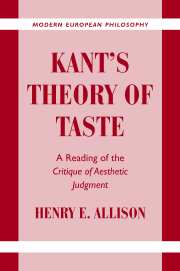Book contents
- Frontmatter
- Contents
- Acknowledgments
- Note on Sources and Key to Abbreviations and Translations
- Introduction
- PART I KANT'S CONCEPTION OF REFLECTIVE JUDGMENT
- PART II THE QUID FACTI AND THE QUID JURIS IN THE DOMAIN OF TASTE
- PART III THE MORAL AND SYSTEMATIC SIGNIFICANCE OF TASTE
- PART IV PARERGA TO THE THEORY OF TASTE
- Notes
- Bibliography
- Index
Introduction
Published online by Cambridge University Press: 18 January 2010
- Frontmatter
- Contents
- Acknowledgments
- Note on Sources and Key to Abbreviations and Translations
- Introduction
- PART I KANT'S CONCEPTION OF REFLECTIVE JUDGMENT
- PART II THE QUID FACTI AND THE QUID JURIS IN THE DOMAIN OF TASTE
- PART III THE MORAL AND SYSTEMATIC SIGNIFICANCE OF TASTE
- PART IV PARERGA TO THE THEORY OF TASTE
- Notes
- Bibliography
- Index
Summary
The eighteenth century, usually known as the “Age of Reason,” has also been characterized as the “Century of Taste.” If this juxtaposition seems strange to us today, it is because we have lost sight of the ideal, normative element, which, as Gadamer points out, was essential to the concept of taste as it developed in the seventeenth and eighteenth Centuries. Thus, whereas for us to say that a question or evaluation is a matter of taste is to imply that it is merely a private, subjective matter lacking any claim to normativity, this was not at all the case in the eighteenth century. On the contrary, as Gadamer also points out, taste was thought of as a special way of knowing, one for which rational grounds cannot be given, but which nonetheless involves an inherent universality. In short, it was not a private but a social phenomenon, inseparably connected with a putative sensus communis. Moreover, taste, so construed, was not limited to the realm of the aesthetic, but also encompassed morality, indeed, any domain in which a universal order or significance is thought to be grasped in an individual case.
It is therefore in terms of this widely shared viewpoint that we must understand both Kant's lifelong concern with the question of taste and his definitive account of it given in the Critique of Judgment. For in this respect, as in so many others, he was very much a man of his time, even though, as we shall see, this did not prevent him from breaking with the orthodoxy of the day on a number of crucial points regarding taste.
- Type
- Chapter
- Information
- Kant's Theory of TasteA Reading of the Critique of Aesthetic Judgment, pp. 1 - 10Publisher: Cambridge University PressPrint publication year: 2001

